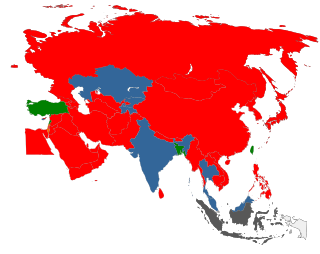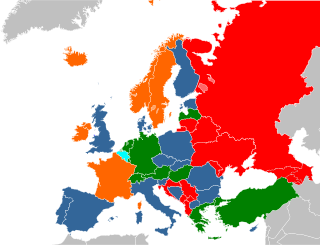Prostitution in Armenia is illegal [1] under administrative law [2] (Article 179.1). [3] Related activities such as running a brothel and pimping are prohibited by the Criminal Code, [4] [5] although there are known to be brothels in the capital, Yerevan, and in Gyumri. [6] According to UNESCO, since the collapse of the Soviet Union in 1991, prostitution in the country has grown. [7] There are about 5,600 women involved in prostitution in Armenia, [8] roughly 1,500 of them are in Yerevan. [9] However, official police figures are far lower, for example 240 in 2012. [1] Police and other safety forces reportedly tolerate prostitution. [9] Many women turn to prostitution due to unemployment. [10]
Child prostitution is a problem in the country, [11] but this is denied by the authorities. [1] [11] Sex trafficking is also a problem. [12]
At the start of the 20th century, prostitution in Armenia was legal and regulated. The main objective of the regulation was to control sexually transmitted infections. [13]
Brothels could be opened by women over 35 years old. The brothel could not be within 150 sazhens (320 metres) of churches, schools, and other public places. The owner must live on the premises and not engage in prostitution herself. She could take a maximum of 3/4 of the prostitutes' earnings. [13]
A former brothel in Teryan Street, Yerevan is still noticeable by its carved naked women on the facade. [13]
During majority of the Soviet period, prostitution officially didn't exist. Prostitutes were sent to be "re-educated" in labour camps. [14] It wasn't until 1987, that the Administrative Code included the prohibition of prostitution. [13]
The head of Dermatology and Infectious Diseases Scientific-Medical Center, doctor-dermatologist Samvel Hovhannisyan, was quoted as saying in June 2015: "The legalisation of prostitution in Armenia may cause a reduction of a rate of sexually transmitted diseases to 60%." He added that the "ancient profession" must be strictly controlled by the country. [7]
In 2016, the Helsinki Citizens’ Assembly’s Vanadzor Office president, Artur Sakunts, called for prostitution to be legalised and regulated. He said the taxes paid by the sex workers would benefit the country, and that “Paid sex services should not be considered a punishable act; they should not be prosecuted not to be ever manageable at the hands of organized criminal groups which could make [sex workers] victims of internal trafficking.” [15]
In the run-up to the 2017 Armenian parliamentary election, former prime minister, Hrant Bagratyan, of the Free Democrats party said prostitution should be legalised and licensed, and taxation of their services would be positive towards the state's budget. [16]
Human traffickers exploit domestic and foreign victims in Armenia, and traffickers exploit victims from Armenia abroad. Armenian women and children are subjected to sex trafficking in the UAE and Turkey. Armenian women and children are also subjected to sex trafficking within the country. Russian women working as dancers in nightclubs are vulnerable to sex trafficking. [12]
The United States Department of State Office to Monitor and Combat Trafficking in Persons ranks Armenia as a 'Tier 2' country. [12]

Prostitution in the Netherlands is legal and regulated. Operating a brothel is also legal. De Wallen, the largest and best-known Red-light district in Amsterdam, is a destination for international sex tourism.

Prostitution in Taiwan was made illegal under a 1991 law. Legislation was introduced in 2011 to allow local governments in Taiwan to set up "special zones" where prostitution is permitted. Outside these zones prostitution is illegal. As of 2017 no "special zones" had been opened.

In Great Britain, the act of engaging in sex as part of an exchange of various sexual services for money is legal, but a number of related activities, including soliciting in a public place, kerb crawling, owning or managing a brothel, pimping and pandering, are illegal. In Northern Ireland, which previously had similar laws, paying for sex became illegal from 1 June 2015.

The legality of prostitution in Asia varies by country. There is often a significant difference in Asia between prostitution laws and the practice of prostitution. In 2011, the Asian Commission on AIDS estimated there were 10 million sex workers in Asia and 75 million male customers.
Forced prostitution, also known as involuntary prostitution or compulsory prostitution, is prostitution or sexual slavery that takes place as a result of coercion by a third party. The terms "forced prostitution" or "enforced prostitution" appear in international and humanitarian conventions, such as the Rome Statute of the International Criminal Court, but have been inconsistently applied. "Forced prostitution" refers to conditions of control over a person who is coerced by another to engage in sexual activity.
Prostitution in the Czech Republic is legal, but organized prostitution is prohibited. Ever since the Czechoslovak Velvet Revolution (1989) led to the creation of the two independent states Czech Republic and Slovakia, prostitution has been flourishing and has contributed its share to the region's booming tourist economy. Prostitution is widespread in Prague and areas near the Republic's western borders with Germany and Austria. In 2002, the Czech Statistical Bureau estimated the trade to be worth six billion crowns a year. UNAIDS estimate there are 13,000 prostitutes in the country. In Prague, the city's third district, immediately east of the center, is home to much of the city's sex industry.

Prostitution in Spain is not addressed by any specific law, but a number of activities related to it, such as pimping, are illegal. In 2016, UNAIDS estimated there to be 70,268 prostitutes in the country, although other estimates put the number higher. Most prostitutes in the country are immigrants. The sex industry in Spain is estimated to be worth €3.7 billion.
Prostitution in Senegal is legal and regulated. Senegal has the distinction of being one of the few countries in Africa to legalize prostitution, and the only one to legally regulate it. The only condition that it is done discreetly. Prostitution was first legalised in 1966. UNAIDS estimate that there are over 20,000 prostitutes in the country. The average age for a sex worker in Senegal is 28 years old and female.
Prostitution in Romania is not itself criminalized, although associated activities, such as procuring, are criminal offenses, and solicitation is a contravention punishable by fines.
Prostitution in Argentina is legal under Federal law. Article 19 of the constitution states: "The private actions of people that do not offend in any way the public order and morality, nor damage a third person, are only reserved to God, and are exempt from the authority of the magistrates." Organised prostitution is illegal. In addition, individual provinces may place further restriction on the trade. For example, in San Juan, publicly offering sex services for money is punishable by up to 20 days in jail. In 2012, newspapers were banned from carrying classified-ads offering sexual services. UNAIDS estimated there to be about 75,000 prostitutes in the country in 2016.
Prostitution in Israel was legal until December 2018, but organised prostitution in the form of brothels and pimping were prohibited. Legislation passed in the Knesset on 31 December 2018 that criminalises the "clients" of prostitutes came into force in May 2020, and was regulated since July 2020 under the Israeli Abolition of Prostitution Consumption Law, where fines will be cast for consumption of prostitution services from an adult. This legislation makes Israel the tenth country to adopt the "Nordic model". The Ministry of Social Affairs and Social Services estimates there to be 14,000 prostitutes in the country.

Prostitution in Ukraine is illegal but widespread and largely ignored by the government. In recent times, Ukraine has become a popular prostitution and sex trafficking destination. Ukraine is a source, transit, and destination country for women and children trafficked transnationally for the purposes of commercial sexual exploitation. Ukraine's dissolution from the Soviet Union, saw the nation attempt to transition from a planned economy to a market economy. The transition process inflicted economic hardship in the nation, with nearly 80% of the population forced into poverty in the decade that followed its independence. Unemployment in Ukraine was growing at an increasing rate, with female unemployment rising to 64% by 1997. The economic decline in Ukraine made the nation vulnerable and forced many to depend on prostitution and trafficking as a source of income. Sex tourism rose as the country attracted greater numbers of foreign tourists.
Prostitution in Kazakhstan is itself legal, but acts facilitating prostitution, such as operating a brothel or prostitution ring, are illegal. Forced prostitution and prostitution connected to organised crime are prohibited. Prostitution is a serious problem. NGOs reported that criminal prostitution rings often included local law enforcement officials.

The legality of prostitution in Europe varies by country.
Prostitution in Albania is illegal but widespread.
Prostitution in Azerbaijan is illegal but common. Prostitution is an administrative offence and punishable by a fine. Keeping a brothel is a criminal offence and punishable by up to 6 years' imprisonment. In 2017 a draft law proposing to add heavy fines to the punishment for keeping a brothel was before the National Assembly. It has been estimated that there are 25,054 prostitutes in Azerbaijan, some of which are aged 15 to 18.

Prostitution laws varies widely from country to country, and between jurisdictions within a country. At one extreme, prostitution or sex work is legal in some places and regarded as a profession, while at the other extreme, it is a crime punishable by death in some other places.
Prostitution in Namibia is legal and a highly prevalent common practice. Related activities such as solicitation, procuring and being involved in the running of a brothel are illegal. A World Bank study estimated there were about 11,000 prostitutes in Namibia.
Prostitution in Botswana is not illegal, but laws such as public disorder, vagrancy, loitering and state recognised religious provisions are used to prosecute prostitutes. Related activities such as soliciting and brothel keeping are illegal. Botswana has made proposals to make prostitution legal to prevent the spread of AIDS. However, there has been mass opposition to it by the Catholic Church. Prostitution is widespread and takes place on the street, bars, hotels, brothels and the cabs of long-distance trucks.
Prostitution in Papua New Guinea is generally regarded as illegal but widely practiced with the laws rarely enforced. Prostitution occurs on the streets, in bars, brothels and in logging, mining, and palm oil areas. In 2010 it was estimated there were 2.000 prostitutes in the capital, Port Moresby. The drought in 2016 caused a rise in prostitution. Many of the women have turned to sex work due to poverty or unemployment.